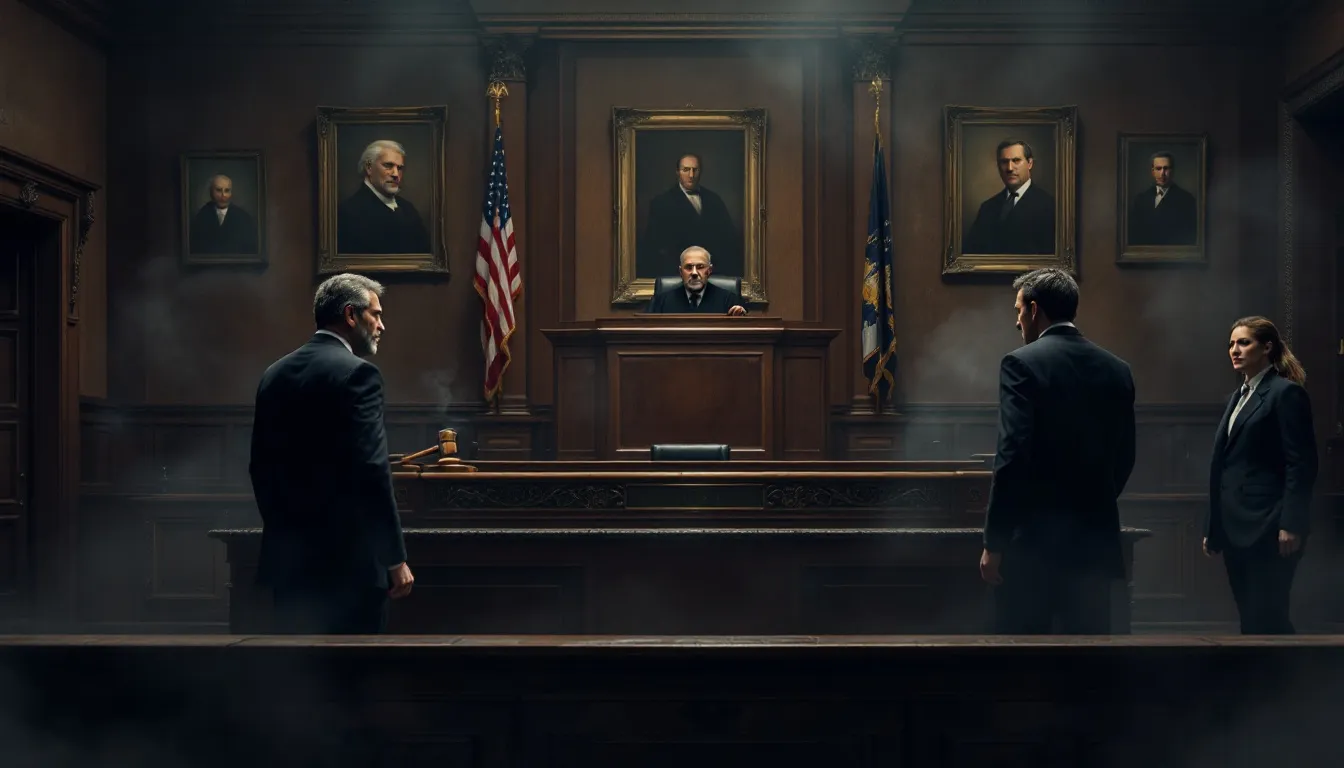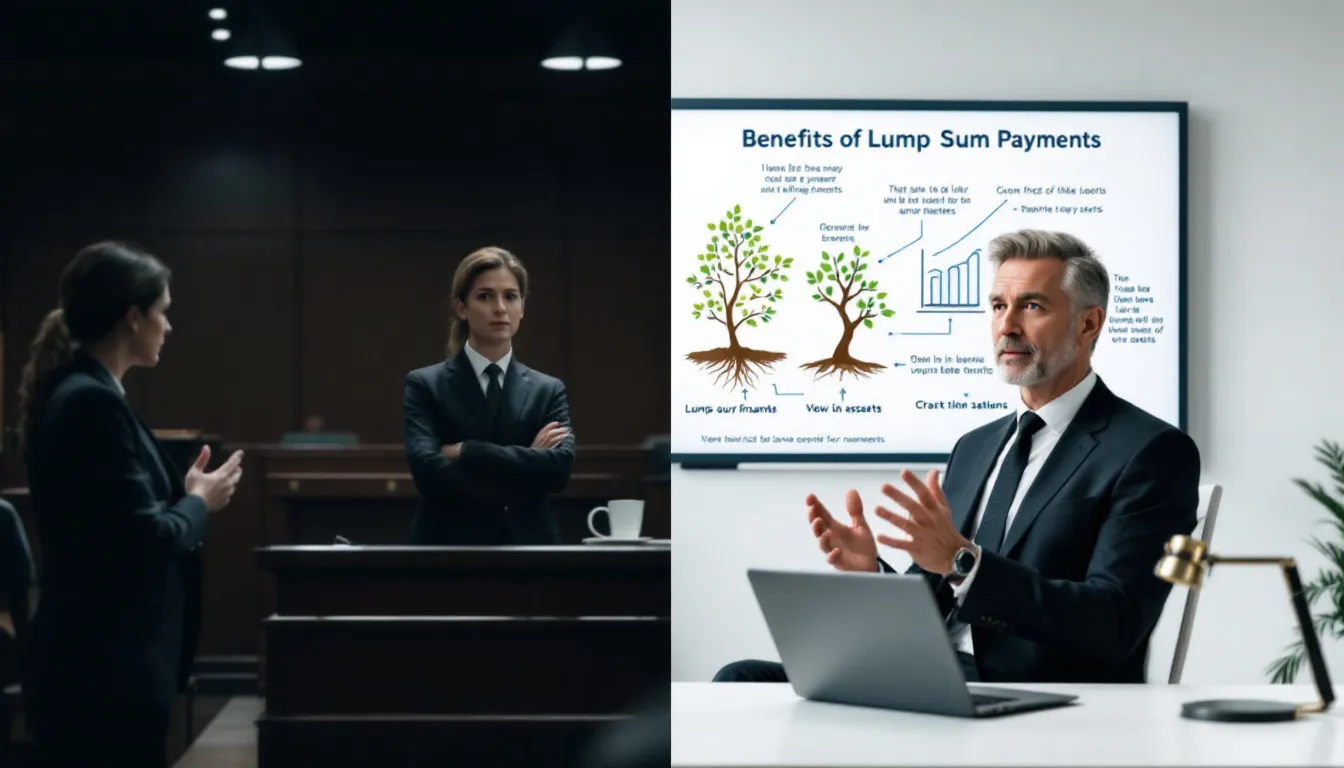How to Best Settle Pre Trial for Maximum Benefit
Wondering if you should settle before trial? Settling a legal dispute before trial can save you time, money, and stress. In this article, we’ll explain what a pretrial settlement is, its benefits, the process, and important factors to consider.
Key Takeaways
- Pretrial settlements allow for a formal resolution of legal disputes before trial, reducing costs, stress, and public scrutiny for all parties involved.
- The involvement of personal injury lawyers is crucial in the pretrial process as they assess damages, draft demand letters, and negotiate settlements to ensure fair compensation.
- Settlement amounts are influenced by various factors, including the severity of injuries, medical expenses, lost wages, and negotiation skills of legal representation.
What is a Pretrial Settlement?

An out-of-court settlement, also recognized as a pretrial settlement, is an agreed resolution to a legal conflict that occurs before the matter escalates to a courtroom trial. Such settlements are especially prevalent in personal injury cases—ranging from car crashes to slip and fall accidents—where the disputing parties opt for a private resolution. Their main aim in doing so is often rooted in dodging the substantial costs, emotional turmoil, and unpredictability that accompany jury trials.
The crux of any personal injury settlement revolves around its primary elements: the sum settled upon for compensation, specific terms dictating said settlement’s execution, and an agreement relinquishing future liability claims. Typically encompassed within this pact is monetary recompense dispensed by the party responsible for causing harm to cover medical bills accrued by injuries sustained or wages lost due to inability to work post-incident. Opting for such pretrial agreements grants both sides leverage over negotiating compensatory figures rather than leaving these critical decisions up to jurors’ discretion.
Such amicable resolutions prior to trials are often seen as favorable among defendants—that includes insurance providers along with businesses—as it provides them avenues through which they can curtail hefty reparations while simultaneously sidestepping potential negative attention drawn toward their practices or standings. Engaging directly helps expedite reaching agreeable terms between involved individuals, which serves toward mitigating Financial strain as well as averting additional stress placed on all parties concerned.
Advantageously streamlining disputes outside formal court proceedings does not solely benefit those immediately implicated, but concurrently lessens pressure faced by courts themselves—a welcome reprieve given already taxed judicial resources.
Advantages of Settling Pre Trial

Before:
Settling a personal injury case before trial offers several compelling benefits that can make the process more appealing compared to a courtroom battle. First and foremost, it significantly reduces the overall expenses involved. Trials are notoriously expensive, with costs rapidly accumulating due to attorney fees, court costs, and other related expenses. By opting for a settlement agreement, both parties can avoid these financial burdens and reach a resolution more economically.
After:
Settling a personal injury case before trial offers several compelling benefits.
- It significantly reduces the overall expenses involved.
- Trials are notoriously expensive, with costs rapidly accumulating due to attorney fees, court costs, and other related expenses.
- By opting for a settlement agreement, both parties can avoid these financial burdens and reach a resolution more economically.
Another critical advantage is the reduction in time and emotional strain. Court proceedings can be lengthy and stressful, often taking months or even years to conclude. In contrast, settlement negotiations typically result in a faster resolution, allowing the injured party to receive compensation sooner and begin moving forward with their life. Additionally, the confidential nature of settlements helps protect the privacy of the involved parties, keeping sensitive information out of the public eye.
Settlement out of court also grants both parties greater control over the outcome. Unlike a jury trial, where the decision lies in the hands of strangers, a settlement allows the involved parties to negotiate terms that are fair and reasonable for both sides. This collaborative approach can lead to a more satisfactory and amicable resolution, minimizing the emotional toll and fostering a sense of closure.
Maintaining control over the outcome enables parties to agree on a fair settlement that addresses their specific needs and concerns.
The Role of Personal Injury Lawyers in Pretrial Settlements
Attorneys specializing in personal injury are critical to the success of pretrial settlement proceedings, offering expert navigation through the intricate landscape of personal injury claims and advocating for equitable compensation on behalf of those harmed. A seasoned personal injury lawyer meticulously calculates all damages related to the case—from medical bills and income loss to intangible losses like pain and suffering—to establish a strong foundation for presenting an effective argument during trial or negotiations with insurers.
Such lawyers have the pivotal task of preparing a demand letter that delineates case specifics as well as desired reparations. This document is instrumental in shaping initial discussions towards reaching a mutual agreement. Possessing adept negotiation skills and intimate familiarity with insurance practices, these legal professionals engage directly with insurance agents—employing their savvy negotiator expertise—and endeavor tirelessly to achieve just recompense for their clients. Their adeptness at interpreting complex insurance terminology assures client interests remain safeguarded throughout bargaining interactions.
Advocates dealing with personal injuries provide crucial counsel legally, steering clients through an often daunting resolution process while scrutinizing liability factors alongside assessing harm severity—all aimed at alleviating any stress from negotiation-related pressures so attention can stay concentrated on recuperation. Deciphering optimal steps forward within each unique scenario enhances prospects substantially for not only successful outcomes but also appropriate restitution appropriate to what their clientele rightfully deserves.
Contact 1-800-THE-LAW2 today for a free legal consultation with a personal injury attorney in our professional network.
Factors Influencing Pretrial Settlement Amounts
In the context of most personal injury cases, several elements are pivotal in establishing the sum for a pretrial settlement. The gravest determinant is how serious the injuries suffered by the claimant are. More grievous or enduring impairments typically warrant heftier sums due to substantial medical expenses and ongoing care requirements. The degree of property damage incurred during the incident can also influence the ultimate value of compensation.
Health-related outlays form another crucial factor when setting settlement amounts—encompassing bills from doctor appointments, hospitalization, surgeries, and continual treatment regimens. A critical element that’s taken into account is whether post-incident incapacities impede employment prospects. Settlements thus reflect not only immediate lost earnings but also potential future income losses as well. To this loss of wage consideration stand other economic damages accrued which significantly inform decision-making around settlements.
Insurance coverage breadth alongside policy ceilings plays consequential roles in shaping settlement figures. It’s commonplace for insurers to prefer settling within these boundaries to curb their financial exposure. If there’s an aspect of comparative negligence where fault partially lies with those injured—it could diminish compensation amounts relative to their liability share—and prior health issues present complications regarding culpability assignments affecting final negotiated outcomes.
Lastly, adeptness at bargaining plays a defining role in influencing compensatory sums awarded through negotiations—with experienced personal injury attorneys possessing leverage against insurance entities Procuring enhanced indemnity for clients they represent. An equitable arrangement accounts meticulously for each variable, ensuring recompense equal to incurred adversities by victims.
Steps in the Pretrial Settlement Process
The sequence of actions preceding a trial is structured to secure an equitable and judicious settlement, thereby avoiding the necessity for court intervention. Being acquainted with this progression can bolster your ability to move through it proficiently, thus enhancing your chances of attaining appropriate compensation.
This procedure is initiated when you engage in a preliminary meeting with a personal injury lawyer. Subsequent phases involve gathering and organizing evidence pertinent to your claim. Following the accumulation of adequate proof, crafting and sending a demand letter to the opposing party commences negotiations aimed at reaching a settlement. These pivotal steps are instrumental in constructing a compelling case that paves the way toward fruitful negotiation outcomes.
Initial Consultation with a Personal Injury Lawyer
The initial meeting with a personal injury lawyer is pivotal, as it lays the groundwork for your claim. During this encounter, your attorney will scrutinize the particulars of your incident, examining the extent of your injuries and analyzing who may be at fault. This evaluation is essential to ascertain both how strong your case is and what amount you might expect from a settlement.
Should you consult an experienced personal injury attorney after sustaining serious injuries, they will attentively hear out all details regarding your experience and inform you about various legal pathways available to you. Their advice can significantly guide you in navigating through the complexities of an injury claim by clarifying advantages and disadvantages relevant to your unique circumstances. Such insights are vital for shaping well-informed decisions while managing expectations throughout the ensuing settlement process.
Evidence Gathering and Documentation
Compiling detailed evidence is essential in validating your personal injury claim and bolstering the settlement negotiations process. This critical step requires assembling diverse documentation, including medical records that elucidate the injuries sustained and treatments undergone, police reports providing an authoritative description of the incident, and witness statements to affirm your account, thereby enhancing the credibility of your claim.
These documents are instrumental in shedding light on what transpired during the event as well as detailing the resulting damages.
Having a robust collection of documentation can considerably fortify your position throughout settlement discussions, boosting prospects for securing a just and equitable resolution to your injury claim.
Drafting and Sending a Demand Letter
In initiating the settlement process, the demand letter serves as a critical component in seeking resolution prior to trial. It is a formal plea for compensation that thoroughly details your situation, including both the severity of your injuries and the damages you are pursuing. Providing a precise and comprehensive depiction of your claim kickstarts negotiations by prompting the other party to engage in discussions for settlement.
This document sets into motion the legal proceedings essential for progressing towards an equitable settlement.
Negotiation with the Insurance Company
The settlement process often encounters its toughest phase during negotiations with the insurance company, a stage that might entail several negotiation sessions to arrive at an acceptable agreement. Personal injury lawyers are vital in this context, using their specialized knowledge to skillfully negotiate with insurance adjusters and secure a just settlement for you.
Insurance companies are not your allies. They work to reduce their financial obligations by undermining their liability, offering low payouts, or even rejecting your claims outright, complicating the negotiation process. Engaging an experienced personal injury lawyer can empower you through these complex discussions. They will represent your interests robustly, ensuring comprehensive consideration of all relevant costs like medical expenses and lost wages in the concluding settlement offer.
Common Challenges in Pretrial Settlements

The process leading up to pretrial settlements can be fraught with difficulties. Insurance companies frequently initiate settlement negotiations by extending offers that are far below the actual value of the claim, which necessitates steadfastness and a comprehensive grasp of your claim’s genuine worth in order to negotiate effectively.
Another regular obstacle is delays during the negotiation phase. The lengthening of discussions due to conflicts about settlement terms can lead to increased exasperation and anxiety for those involved. Grappling with an understanding of how the settlement process works without the aid of legal counsel can intensify both its complexity and emotional toll.
These challenges underscore why it is crucial to have skilled legal advisors when managing settlement negotiations, ensuring that you navigate these issues proficiently.
When to Reject a Pretrial Settlement Offer
Determining the right moment to decline a pretrial settlement proposition is imperative for obtaining just compensation. Before accepting any settlement, it’s necessary to conduct an exhaustive evaluation of your injuries and contemplate their prospective long-term repercussions. Given that severe injuries can have enduring effects that might not be evident at first glance, future medical requirements and possible complications must be factored into consideration.
Insurance companies are known to propose inadequate initial settlements, capitalizing on claimants’ tendencies toward rapid acceptance. Nevertheless, by turning down an early offer you may bolster your negotiating power and prompt the insurance company to put forward a more equitable settlement proposal.
Upon rebuffing such an offer, seeking guidance from a personal injury lawyer becomes essential in devising forthcoming tactics and strengthening your bargaining stance.
Legal Fees and Costs in Pretrial Settlements

When contemplating pretrial settlements, the impact of legal fees and associated expenses is paramount. Personal injury lawyers represent clients. Take on cases with a contingency fee arrangement, where they receive compensation through a portion of the client’s settlement. This percentage typically equates to one-third but may increase if litigation progresses to trial.
Beyond attorney fees, additional expenditures such as court charges, payments for expert witnesses’ testimony, and other administrative costs must be factored in. These can quickly accumulate. Accurately accounting for such financial obligations during settlement negotiations is vital since some may be subtracted directly from the final settlement amount – a critical point that should be clarified with your personal injury lawyer.
Adept negotiation by an experienced personal injury lawyer could potentially result in certain outlays being covered within the agreed-upon settlement figure itself. It’s imperative to grasp this monetary landscape thoroughly, doing so will assist you in setting realistic expectations and making informed decisions throughout your quest for rightful compensation.
How Long Does a Pretrial Settlement Take?
The length of time it takes to reach a pretrial settlement can be quite variable, sometimes taking as little as several months or stretching out over multiple years. The amount of time is influenced by factors such as the severity of injuries sustained, how quickly evidence is collected and organized, and the level of eagerness from both parties to come to an agreement. Often when severe injuries are involved, settlements occur more quickly because there’s a pressing need for medical treatment.
If evidence-gathering and documentation happen efficiently, they have the potential to expedite the resolution process significantly. On the other hand, if recovery from injuries drags on or ongoing treatment is needed, this could delay reaching a settlement. Strategies employed by insurance companies during negotiations are pivotal—when all sides show motivation for settling promptly. This tends toward faster conclusions due in part to avoiding costly litigation risks.
In general, comparisons between trials and settlements indicate that settlements usually provide relief sooner for those who have been injured since they tend to conclude more quickly than court proceedings do.
Structured Settlements vs. Lump Sum Payments

When resolving a personal injury case, you have the option of receiving your compensation through either a structured settlement or a single lump sum payment. A structured settlement provides ongoing payments over an extended period, which can help maintain financial security and guarantee consistent income flow. Such payments in personal injury cases are often exempt from taxes, enabling beneficiaries to preserve more of their awarded funds.
Conversely, choosing a lump sum allows claimants to gain immediate access to all their money at once, offering them heightened flexibility in managing large expenses. This could be particularly advantageous for those facing urgent financial demands. It also poses risks related to hasty spending and potential tax liabilities.
Deciding whether to opt for structured settlements with recurring payouts or a full lump-sum disbursement hinges on the specific fiscal needs and future objectives of each individual involved in the personal injury claim process.
Summary
In essence, choosing to settle before trial has multiple advantages such as lower expenses, quicker conclusion, and enhanced control over the final result. Personal injury lawyers are crucial in guiding clients through the settlement process, from initial meetings to concluding discussions with insurance companies. Recognizing elements that impact settlement figures and being cognizant of usual obstacles can aid in securing fair and justifiable compensation.
Deciding on a pretrial settlement enables both sides to avoid the unpredictability and tension associated with court trials by striving for an agreement satisfying all involved. Whether opting for a structured payment plan or taking a lump sum payout is more appealing depends on your individual circumstances. Staying well-informed and prepared fortifies you in making optimal decisions. Approach the situation confidently, assured that achieving an effective bargained resolution offers not only financial redress but also peace of mind.
Frequently Asked Questions
What is a pretrial settlement?
Before a legal dispute reaches the courtroom, the involved parties may opt for a pretrial settlement to conclude personal injury cases such as those arising from car accidents or slip-and-fall scenarios.
By settling before trial, all parties can conserve time and resources.
Why should I consider settling pretrial?
Settling a pretrial can save you time, cut costs, and alleviate emotional stress, making it a wise choice over a lengthy trial process.
How do personal injury lawyers assist in pretrial settlements?
Personal injury attorneys are essential in securing pretrial settlements, as they assess damages, construct demand letters, and conduct negotiations with insurance companies to make certain that their clients attain fair compensation.
Their specialized knowledge is instrumental in enhancing the effectiveness of maximizing the settlement amount for their clients.
What factors influence the amount of a pretrial settlement?
The amount of a pretrial settlement is influenced by factors such as the severity of injuries, medical expenses, lost wages, insurance policy limits, and comparative negligence.
These elements play a critical role in negotiating a fair settlement.
How long does it typically take to reach a pretrial settlement?
Reaching a pretrial settlement typically takes anywhere from a few months to several years, influenced by the complexity of the case and the parties’ willingness to negotiate.
A proactive approach to evidence gathering and negotiation can help expedite the process.




